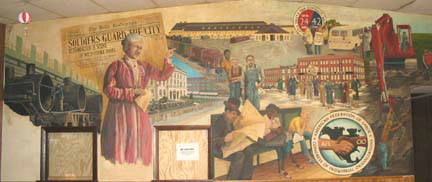|
Famous activist and union members get remembered, but what about the everyday people who strive to make life better in their own community?
Tina Stewart Brakebill, an ISU history instructor, has done that for Barbara (Barbe) Lennon (1881-1983), a Bloomington teacher, activist and mother who strove to represent her profession and improve local conditions.
This is not only an activist’s biography, but an in-depth study of what women could and could not do in early 20th century Bloomington, Illinois.
Barbe came to Odell, Illinois as child, an emigrant from Switzerland, where her family farmed. As a young woman she came to Bloomington to attend high school, a rare opportunity in 1896, aspiring to a teaching career.
After her apartment burnt in the 1900 downtown Bloomington fire, the teenager was taken in by John and Juna Lennon. Lennon was a national labor figure, AFL Treasurer and head of the Tailors’ Union. Barbe joined the household, becoming like a daughter and after high school graduation, became a Bloomington school teacher.
When Juna Lennon died in 1919, Barbe married 71-year-old John in 1920 and together they had one son, before his death in 1923.
A widow with a young son, Barbe supported herself as a school teacher. Yet she was always more. She organized the Bloomington Federation of Teachers and was there when the Illinois Federation of Teachers began. She was active in local elections, the Bloomington & Normal Trades & Labor Assembly, the Democratic Party and statewide women’s and women’s labor organization.
The impressive job Brakebill does with her deep research is documenting the daily life triumphs and woes of a woman who cut a path through social expectations. Barbara Egger Lennon’s meager teacher’s pay always kept just a bare step ahead of poverty, yet she still strove to improve conditions for Illinois teachers, further her education and stand up for workers. This well-written local history is a snapshot of women’s lives in the early 20th century and deserves a place on your shelf.
Barbara Egger Lennon by Tina Stewart Brakebill, Westview Press ISBN 978-0-8133-4797-4
Reviewed by Mike Matejka
|



